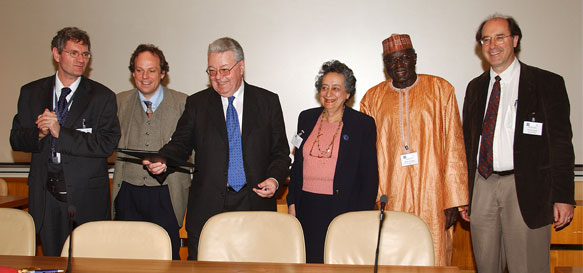Geneva, 13 May 2004. First practical actions toward the realization of open access to knowledge in the sciences and in the humanities have been formulated at a meeting on the implementation of the recommendations in the Berlin Declaration held at CERN1, Geneva, 12 and 13 May 2004, and coordinated by the Max Planck Institute for Gravitational Physics (Albert Einstein Institute). During the meeting, the Declaration was signed by CERN and the University of Pavia.
Geneva, 13 May 2004. First practical actions toward the realization of open access to knowledge in the sciences and in the humanities have been formulated at a meeting on the implementation of the recommendations in the Berlin Declaration held at CERN1, Geneva, 12 and 13 May 2004, and coordinated by the Max Planck Institute for Gravitational Physics (Albert Einstein Institute). During the meeting, the Declaration was signed by CERN and the University of Pavia.
The Berlin declaration was launched in October 2003 at a meeting organized by the Max Planck Society to ensure the free and unrestricted access of everyone to the results of scientific research and to the cultural heritage of mankind. So far it has been signed by 38 organizations throughout the world, which are now taking concrete measures for its implementation.
In opening the meeting, Robert Aymar, Director-General of CERN, said, "Fifty years ago 12 European countries adopted the Convention of CERN, which was the result of the vision of scientists and politicians from Europe, and around the world, and which has proven to be the basis for the success of this Organization. The Convention requires openness, stipulating that "the results of its (CERN's) experimental and theoretical work shall be published or otherwise made generally available".
For the first time ever, the Internet offers the possibility of making knowledge universally accessible. As a result, publishing practices and the system of quality assurance used so far in the sciences and the humanities are expected to undergo considerable changes. In signing the "Berlin Declaration", the research organizations advocate consistently using the Internet for scientific communication and publishing.
It was this spirit of openness and sharing in a large community that led Tim Berners-Lee and Robert Cailliau of CERN to invent the World Wide Web 15 years ago. Now CERN, together with its collaborating institutes, is one of the leading forces developing Grid Computing, which will allow physicists around the world to analyse the data from CERN's new machine, the Large Hadron Collider (LHC), from their "home" institutes.
The process of transforming scholarly communication towards the open access model pioneered by the high-energy physicists of CERN has now taken up additional momentum. With CERN's signature, one of the most distinguished European research institutions has become a Signatory of the Berlin Declaration. At the same time, the University of Pavia has become the first Italian university to sign the declaration. The University is involved in collaborations with many countries in South America and Africa and considers open access as the proper way for the diffusion of scientific results to researchers who cannot afford the high costs of scientific literature.
For the first time the meeting has recognized not only the benefit of open access for science but also its crucial role in turning the Internet into a key element of an open and peaceful world. As the President of the Academy of African Languages, Adama Samassekou, representing the World Summit on Information Society at the Geneva meeting pointed out: "In a world of open access knowledge is a connecting rather than a dividing factor between different cultures. We have to counteract the danger of a knowledge divide blooming from the present practice of commercial scholarly communication. What we need instead is open access as a model for a new, open-minded way of thinking, the only way to address the global challenges emerging from the divide between rich and less rich societies".
Among several nations already on their way towards an open access society, the Federal Republic of Germany, with its partnership between the Max Planck Society, the Fachinformationszentrum Karlsruhe, and the Federal Ministery of Research and Education, plays a leading role. This partnership has taken on a concrete form with a new project to create a nucleus for a national infrastructure for open access to scientific information and cultural heritage. The project is being co-funded by the partners at a level of 25 million Euros for a period of five years.
Further information about the Berlin Declaration
Press Contacts:
CERN Press Office
Phone : +41 22 767 6333
Fax : +41 22 785 02 47
Susanne Milde,
Milde Marketing
Phone: ++49 331 - 721 53 71
Fax: ++49 331 - 721 53 80

